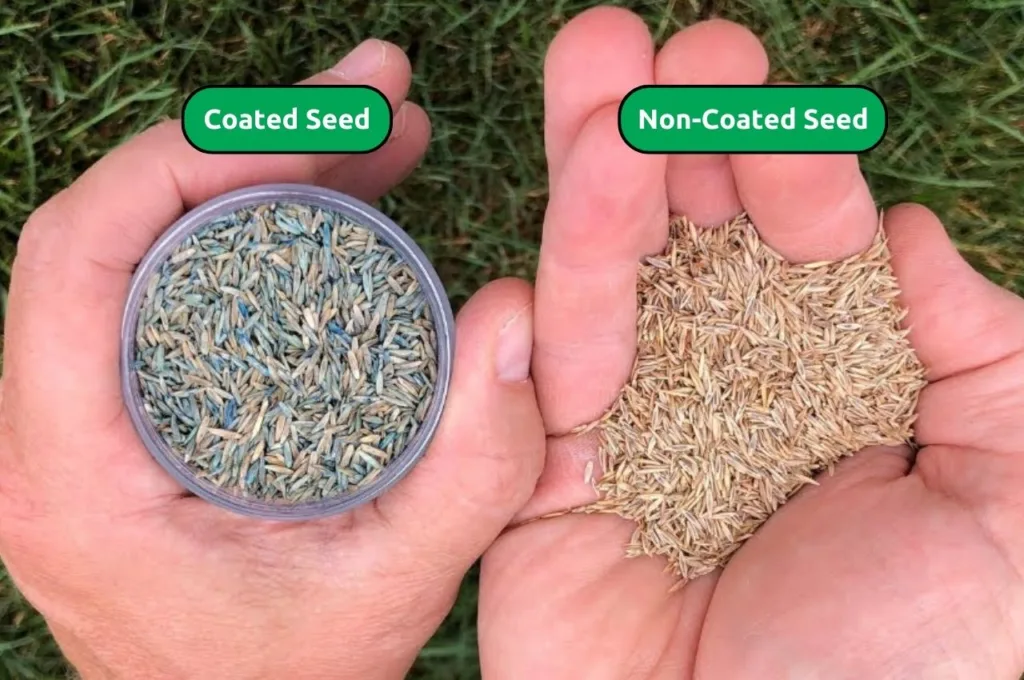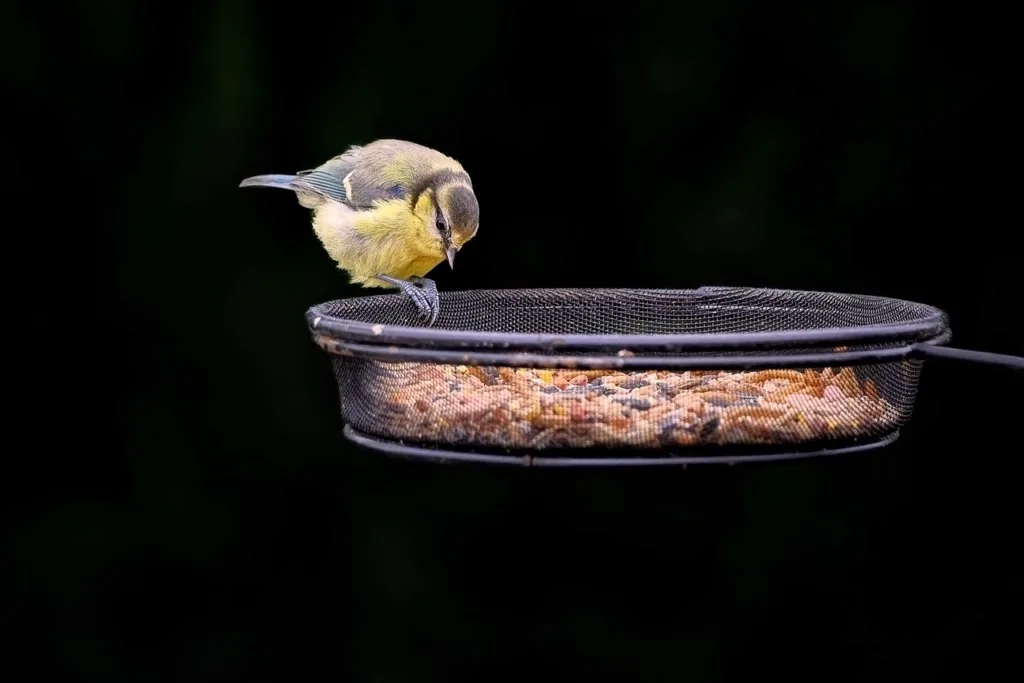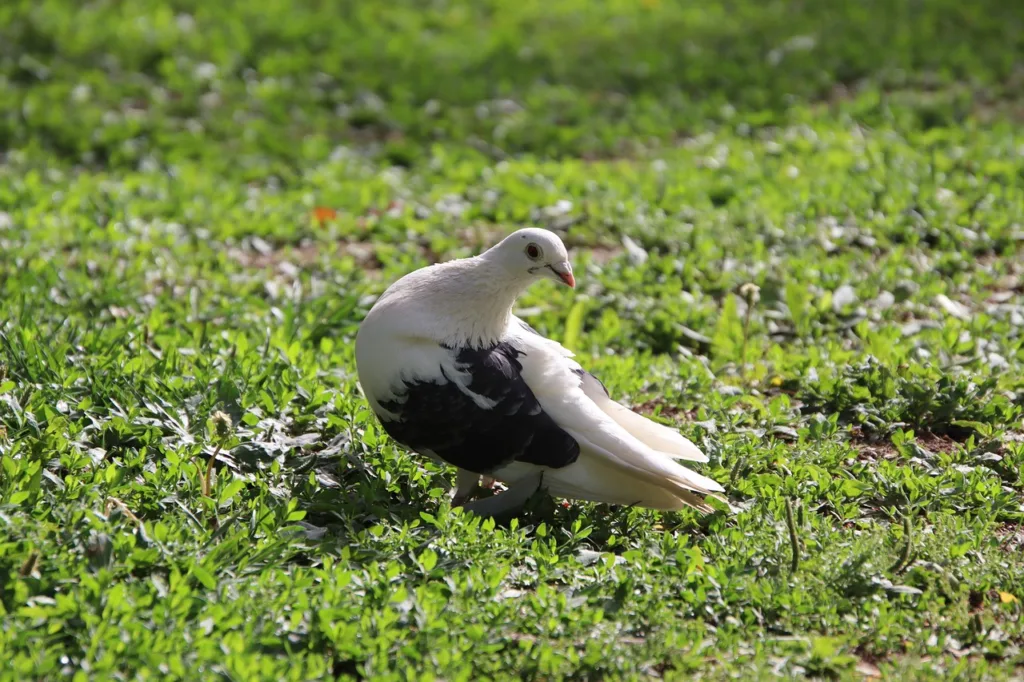Birds love seeds of all variety – but we personally think they have a special radar that detects grass seed.
Trying to deter birds from eating grass seed is particularly difficult because the seed can’t be covered with a conventional tarp, or it won’t grow.
With that said, there are still ways that you can at least reduce the percentage of grass seeds that end up in the bellies of your local wildlife, and that’s what we’re here to share in this guide.
✅Key Takeaways:
Some of the best ways to prevent or stop birds from eating grass seed are:
Cover the seed with topsoil
Tempt birds with spare seed
Scare birds with reflective items, ultrasonic repellers, and scare tape
Place bird feeders around your lawn with an alternative food source
Cover the sown seed with bird netting
Use coated grass seed
Put grow sheets over the grass
Table of Contents
📑 7 Best Methods To Stop Birds Eating Grass Seed
Here are some of the best methods that we’ve had success with in preventing birds from eating grass seed.
Method 1: Cover The Seed With Topsoil
Method success score: 7/10
One simple practice to protect grass seed from birds is to cover it with a thin layer of topsoil or mulch.
While this won’t prevent birds from eating the seed, it’ll make it more difficult for the birds to find the seed on your lawn. Seed covered with soil is also less noticeable to birds from above, so if you’re lucky, you’ll be able to keep the birds at bay simply because they don’t know that the seed exists.
It’s tempting to put a heavy layer of topsoil over your grass seeds to protect them as much as possible, but this is detrimental to seed germination and grass growth because it blocks the sunlight. Only apply a light layer of soil or mulch to the seed.
Method 2: Tempt Birds With Spare Seed
Method success score: 8/10
Another method that has worked well for us is to tempt the birds with spare seed.
Sow the required amount of seed on your lawn, then cover with mulch or top soil, and follow with a scattering of extra seed. The birds that visit your lawn can have their fill of the extra seed, and are less likely to make it to the seed beneath the soil, improving its growth success rate.
This might sound counterintuitive, because leaving the seed on display is bound to attract birds to your lawn. But trust us when we say that 9 times out of 10, birds will find your grass seed regardless of how covered up it is, so leaving excess seed above the soil should actually work in your favor.

Method 3: Use Bird Scarers
Method success score: 6/10
You can also try repelling birds from your lawn by using various forms of bird scarers. These include:
Ultrasonic animal repellers, which emit a noise that birds don’t like
Reflective objects, like discs and CD roms
Repellant scare tape, which reflects light and scares birds off
Bird scarers get a 6 out of 10 from us in terms of their effectiveness. On a personal note, I live across the road from an allotment, and most plots are full of reflective CD roms and water bottles in the growing season. Does this stop birds from crowding the freshly turned soil and eating the newly sown seeds? Sadly, no.
With that said, using bird scarers should at least reduce the number of feathered friends that gather in your garden, so they’re not a complete waste of money.
Method 4: Divert Birds’ Attention To Other Food
Method success score: 8/10
Birds might love grass seed, but there are other foods they love just as much – or even more. You can attempt to keep hungry birds off your new lawn by diverting their attention to other, more desirable food sources in your garden.
Fat balls, peanuts, sunflower seeds, bird cakes and food bars, and even mealworms, are all foods that birds eat. Position these foods at various points around your garden, on bird feeders and tables, and at least some of your feathered visitors should go for these foods instead of your grass seed. Just make sure to keep the food stations well-stocked during the seed germination period.

Method 5: Cover The Grass With Mesh Netting
Method success score: 5/10
If you have a bit more time on your hands and you’re willing to invest in a semi-permanent structure for your lawn, consider covering the freshly seeded grassy area with fine mesh netting.
You’ll need to raise the netting a couple of inches off the ground to prevent birds from landing on the grass and simply pecking through the holes. You can use spare netting to cover fruit bushes and vegetable plants to keep the birds away.
Method 6: Use Coated Grass Seed
Method success score: 5/10
Some manufacturers sell grass seed that’s coated with a protective outer layer that’s usually off-putting in some way to birds. We’ve used grass seed with a bright blue coating, which supposedly prevents birds from eating it because it doesn’t look edible. Some protective seed coatings also have a taste that isn’t pleasant to birds.
From our experience, using coated grass seed isn’t the best way to deter birds from eating the seeds. Birds are smarter than we think – or, at least, many of them don’t care about seed coatings, and they’ll eat the seed anyway.

Method 7: Use Grow Sheets
Method success score: 9/10
To finish with the method that works particularly well for preventing birds from eating newly sown grass seed, our top recommendation is to use grow sheets on your lawn.
These sheets, made from a fleece fabric material, allow air and sunlight to pass through, but stop birds eating the grass seeds beneath.
You’ll need to remove the sheets to water your lawn, which is a bit of a hassle. But we’d still prefer to do this than to lose half of our new grass seed to the local wildlife.
🤷♂️ Why Do Birds Eat Grass Seed?
Birds eat grass seeds because they’re a great food source. Birds have a varied diet – they eat insects, seeds, nuts, fruits, nectar, and even small animals. Grass seeds are ideal for birds because they provide them with essential nutrients like carbohydrates, fats, and proteins. These nutrients are crucial for their energy levels and overall health.
Birds don’t always have easy access to food sources, so when they find something that’s edible, they’ll take what they can get. They’re not picky – they’ll eat what they can to survive, and that includes eating grass seeds from your lawn.
🌱 Do Birds Eat All Grass Seed Types?
Yes, from our experience, hungry birds will eat any type of grass seed.
We read a couple of claims from other sources that said certain types of ryegrass are less appealing to birds, but as we mentioned earlier, birds aren’t picky. You won’t be able to deter birds from your lawn simply by using a specific type of grass seed.
With that said, some birds are at least less likely to eat grass seeds that have been coated with a repellant. It depends on the type of bird – pigeons, for instance, will eat anything.

🤨 What’s The Best Way To Stop Birds Eating Grass Seed?
In our opinion, the best way to stop birds eating grass seed is to simply sprinkle some extra grass seed on top of the covered seed on your lawn, so the birds have something extra to eat without disturbing the seeds that you actually want to grow. This is the better alternative to trying (and usually failing) to keep the birds completely off your lawn, which is pretty demoralizing.
If you’re willing to invest a bit of money into your efforts to protect grass seeds from birds, you can buy grow sheets to place over your lawn after planting grass seed. These will prevent birds from accessing and eating grass seeds while still giving the grass access to sunlight and air.
🏁 Final Word
Thanks for taking the time to read this article! Hopefully, you now have the knowledge to confidently sow grass seeds using methods that will reduce or stop birds from helping themselves once you’ve finished.
If you liked this article, you might also be interested in the following:
FAQ
Which birds eat grass seed?
Most birds eat grass seed in the UK, including pigeons (the main culprit), sparrows, finches, starlings, doves, and even seagulls. Essentially, any bird that you spot eating from a bird feeder is likely to also eat grass seeds from your lawn.
Can you put fleece over grass seed?
Yes, you can put garden fleece over grass seed while it’s growing. A good garden fleece product should protect grass seed from birds, harsh sunlight, and wind, helping to keep the soil moist and promoting grass growth. You’ll need to remove the fleece to water the seed daily.
What is a good bird repellent?
From our experience, we’ve never found a kind method of completely deterring birds from our lawn. However, a combination of repellents and bird deterrents, including shiny objects, bird-proof fencing, ultrasonic machines, and even fake birds, should help in keeping birds away.
What is the best grass seed for birds?
Assuming that you’re asking about the best grass seed to deter birds from eating it, we recommend looking at grass seed that’s coated with a substance that should keep the birds away. The Gro-Sure Aqua Gel Coated Smart Grass Lawn Seed is an example of this type of coated seed. However, no grass seed is completely bird-repellant, so manage your expectations.
